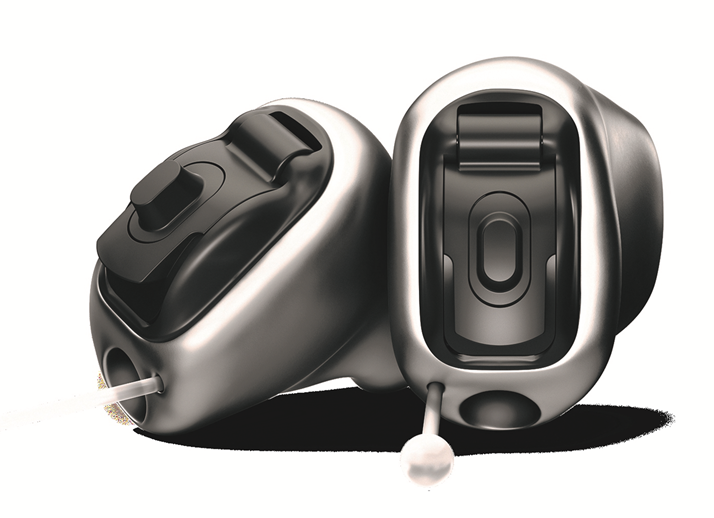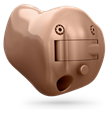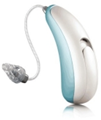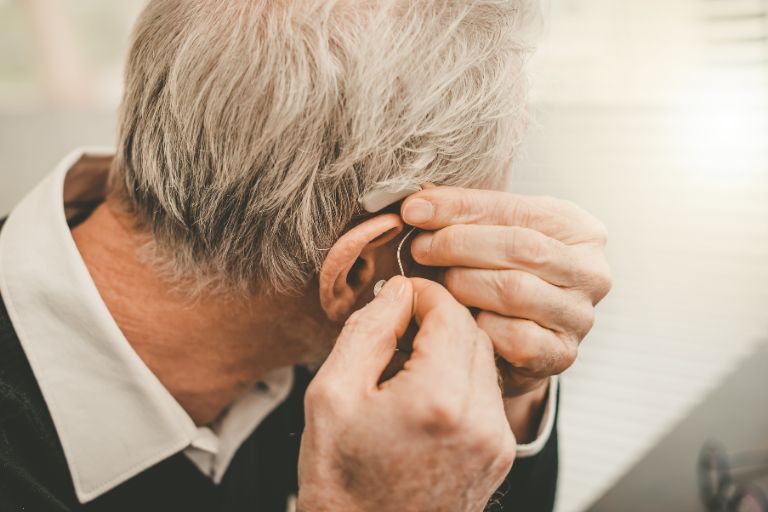
South East Hearing Care Centres offer comprehensive hearing aid services delivered by experienced, independent audiologists. We have the freedom to recommend the most suitable hearing aids for you, selecting from a wide range of leading manufacturers. Our clinics pride themselves on providing unhurried diagnoses, objective advice, and finding the best overall solution tailored to each patient’s specific hearing requirements.
Our state-of-the-art facilities are fully equipped with modern diagnostic tools, allowing for detailed evaluations and accurate recommendations. Book a hearing test appointment today to evaluate your hearing and discover the right hearing aid for your needs.
What is a hearing aid?
A hearing aid is a small electronic device worn in or behind the ear to amplify sound for individuals with hearing loss. It consists of a microphone that picks up sound, an amplifier that makes the sound louder, and a receiver that delivers the amplified sound into the ear canal. Hearing aids are designed to receive, amplify, and transmit sound in a way that compensates for the type and degree of hearing loss experienced by the user.
Modern hearing aids can be precisely programmed and tailored to an individual’s hearing needs. They use advanced signal processing to improve speech clarity, reduce background noise, and provide a more natural listening experience. Hearing aids help people with hearing impairment to better communicate, participate in daily activities, and improve their overall quality of life.
Our hearing aid solutions
South East Hearing Care Centres provide personalised hearing aid solutions tailored to each individual’s unique needs. Our experienced audiologists take the time to thoroughly evaluate each patient’s hearing loss through comprehensive diagnostics using state-of-the-art equipment. Our audiologists have the flexibility to recommend hearing aids from a wide range of the world’s leading manufacturers, which allows them to find you the perfect match, whether it’s for hearing aids’ specific features, fit, or budget requirements.
Our audiologists provide an attentive, unhurried service from the initial consultation through fittings, fine-tuning, and continued aftercare support. Our patient-centric approach aims to build long-lasting relationships, offering the luxury of time to meticulously understand each individual’s needs and deliver exceptional hearing aid solutions.
What are the different types of hearing aids?

Behind-The-Ear (BTE)
The most common hearing aid style, it sits behind the ear and transmits sound to the eardrum via tubing. BTE hearing aids offer a wide range of features and long battery life and are suitable for all types of hearing loss.

In-The- Ear (ITE)
Custom-made hearing aids which fit within the outer portion of the ear, with easy-to-adjust controls. They can accommodate features such as directionality and have multiple listening programmes.

Invisible-In-The-Canal (IIC)
Invisible-in-the-canal hearing aids are the most discreet hearing aids available. Custom-made and tiny, they are worn slightly deeper in the ear canal, making them almost completely invisible.

Completely-In-The-Canal (CIC)
These tiny devices fit deep inside the ear canal. They are virtually undetectable—only the tiny removal handle shows outside the ear canal.

Receiver In The Ear (RITE)
Merging the cosmetic advantages of ITE devices with the technological possibilities of BTE devices, RITE hearing aids are a small unit that hides behind your ear with a virtually invisible sound wire in the ear, making the device very discreet.
Read our beginner’s guide to hearing aids to learn more about the different options available.
Hearing aid brands
Being independent, we have the freedom to work with all of the major international manufacturers and can, therefore, help you find the best possible solution to your particular hearing issue. Here are some of the leading manufacturers you can choose from:
With so many choices, you can find the right option for your hearing needs, lifestyle, and budget.
Latest hearing aid technology and features
A lot of different hearing aid features are now available, and these tend to differ depending on which brand you choose. However, most hearing aids now include:
- Individually Programmed Settings
- Gain Processing
- Digital Feedback Reduction (DFR)
- Digital Noise Reduction (DNR)
- Digital Speech Enhancement (DSE)
- Directional Microphones and DSP
- Bluetooth Connection
- Rechargeable Batteries
Whatever your lifestyle and budget, we will have a digital hearing aid to suit you, from water-resistant options to invisible hearing aids. We offer all types of hearing aids, and while each used to be made for a specific degree of hearing loss, technology has made it so that almost any level of hearing loss can be remedied with nearly any aid style.
Book a hearing aid appointment today
Don’t let hearing difficulties hold you back any longer. Book a comprehensive hearing assessment at one of our convenient clinic locations in Bexhill, Horsham, Chichester, Eastbourne or Seaford. Our experienced audiologists will guide you through every step, from hearing assessments to selecting the perfect hearing aid to meet your needs and lifestyle. Call us today or request an appointment online.
FAQs
How do I know if I need a hearing aid?
Common signs that you may need a hearing aid include frequently asking others to repeat themselves, keeping the television volume very loud, struggling to hear in noisy environments, and feeling isolated from conversations. A hearing test administered by an audiologist can determine if you have hearing loss that would benefit from hearing aids.
Are hearing aids visible or discreet?
Hearing aids come in various styles, from discreet, invisible-in-the-canal models to more visible behind-the-ear devices. South East Hearing Care Centres offers both highly discreet and conventional hearing aid options to fit your preferences and degree of hearing loss.
How much do hearing aids cost?
The cost of hearing aids can vary widely depending on the level of technology and features. Basic digital hearing aids start around £500-£1,000 per ear, while premium, state-of-the-art models with advanced sound processing can cost £2,000-£3,000+ per ear.
When should I get a hearing aid?
Consider getting a hearing aid if you have difficulty hearing conversational speech, especially in noisy environments. An audiologist can conduct a hearing test to evaluate your hearing levels and determine if hearing aids would be beneficial.
What hearing aids are best for severe/profound hearing loss?
Powerful behind-the-ear (BTE) hearing aid styles are usually recommended for severe hearing loss. BTE hearing aids can provide higher amplification levels and are equipped with features like directional microphones and noise reduction to assist with speechreading and hearing in very loud environments.
Does adjusting to hearing aids take a while?
Yes, adjusting to new hearing aids does take some time and patience. Your brain needs to re-learn how to process amplified sounds after being deprived of certain sound frequencies. Most audiologists recommend wearing the hearing aids as much as possible and gradually increasing daily use over 4-6 weeks to allow your brain to adapt fully. Regular follow-up appointments for adjustments also help maximise your hearing aid benefit.

